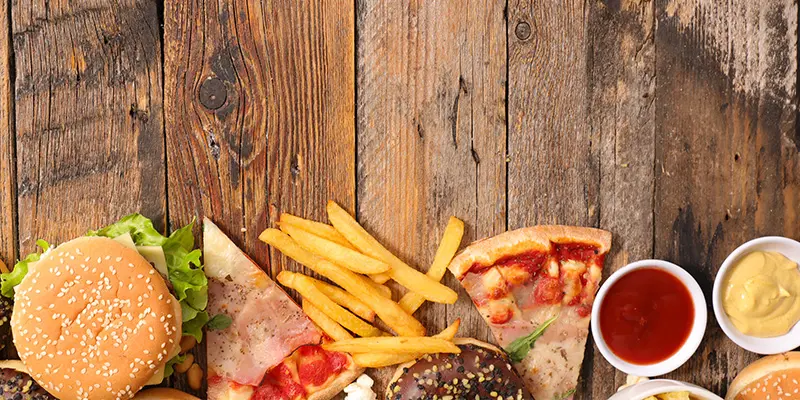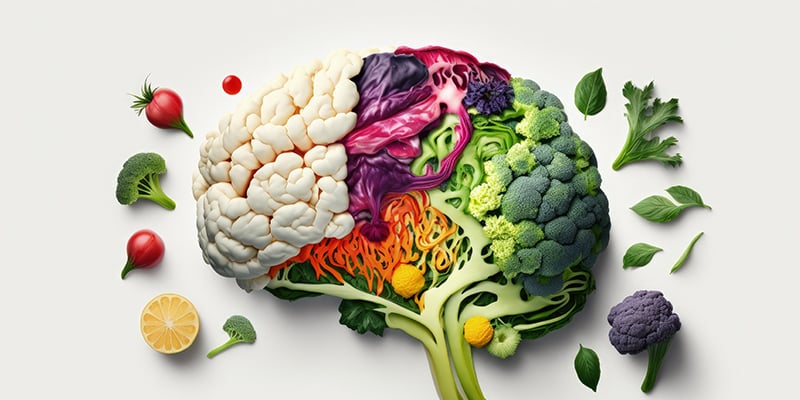
We hear a lot about avoiding highly processed or ultra-processed foods in our diet—in favor of choosing instead whole foods, such as vegetables and fruits—but what are highly or ultra-processed foods, anyway? According to Harvard Health, food processing often involves adding ingredients like sugar, salt, fat, artificial colors, preservatives, flavors, and/or stabilizers, so these processed products are “made mostly from substances extracted from foods, such as fats, starches, added sugars, and hydrogenated fats.” In other words, it feels like a bit of a stretch to call them food in the first place.
Unfortunately, the typical American diet (and grocery store) is chock-full of these kinds of products, from cookies and crackers to frozen meals and sugar-packed sodas. One 2022 report noted that a whopping 73% of the U.S. food supply can be considered ultra-processed—partially because these “Frankenfoods” are much more profitable for manufacturers, costing on average 52% less than minimally processed options. However, for the humans consuming them, they have many impacts that are far from positive—in fact, they’re downright health-destroying. Let’s take a look at just some of the ways in which they harm the entire human body, over both the short and long term.
Whole foods may contain sugar (like you’d find in fruit), but because they also contain fiber, protein, and water, it’s slower to hit the bloodstream and does not cause that same feeling of getting a “hit” or rush when consumed. Click To TweetTHE MANY DANGERS OF ULTRA-PROCESSED FOODS
1. Eating highly processed foods can be as addictive as smoking cigarettes.
One study, published in late 2022 in the journal Addiction, evaluated these foods according to the criteria established when researchers were examining the impacts of tobacco in the 1980s. The findings noted that these addictive hallmarks include:
- Loss of control over intake, such as seen with compulsive or binge eating
- Intense cravings, or strong urges that are difficult to resist
- Inability to reduce consumption—for example, eating even when not hungry
- Continued use despite negative consequences, including serious health concerns like obesity
The study estimated that roughly 14% of adults and 12% of children exhibit signs of food addiction. Ultimately, the study concluded that these foods can be considered psychoactive substances, just like alcohol, marijuana, or opioids, since by creating the 4 side effects outlined above, highly processed foods fit the main criteria of potential for addiction.
2. Ultra-processed foods may increase dementia risk.
We already know that high-glycemic, low-fiber foods, as well as other nutritionally empty culprits, are potential memory destroyers. More specifically, a study presented at the 2022 Alzheimer’s Association International Conference, published in JAMA Neurology and reported by CNN, stated that consuming more than 20% of the daily calorie intake (that is, 400 calories of a 2,000-calorie diet) via ultra-processed foods may increase the risk for cognitive decline. This decline occurred at a rate of 28% faster among men and women who consumed the largest amounts of these foods, and they also experienced a 25% faster decline in executive function. Unfortunately, many Americans are consuming far more than 20% of their daily calories in ultra-processed foods, with one 2017 study reporting that number at 57.5% among its survey participants.
3. Highly processed foods boost the odds of experiencing mental health issues.
A 2022 review of 17 studies looked at the links between processed foods and mental health disorders. The findings stated that “greater ultra-processed food consumption was cross-sectionally associated with increased odds of depressive and anxiety symptoms” and “was associated with increased risk of subsequent depression.” Another study from 2020 found that participants whose ultra-processed food intake made up more than 73% of their total energy intake had a 35% higher risk of depressive symptoms, compared with those who consumed 34% or less of their total calories from ultra-processed foods. Clearly, there is a reason why the Standard American Diet spells SAD!
4. Eating ultra-processed foods has been linked to increased physical health risks.
In 2019, two large European studies were published in The BMJ and established a positive association between eating highly processed foods and the risk of cardiovascular disease and even death. The first study, from NutriNet-Santé, surveyed 105,159 French adults (79% of whom were female, with an average age of 43 years) and found that a “10% increase in the proportion of ultra-processed food in the diet was associated with significantly higher rates of overall cardiovascular disease, coronary heart disease, and cerebrovascular disease (an increase of 12%, 13%, and 11%, respectively).” Meanwhile, a diet higher in unprocessed or minimally processed foods was correlated with a lower risk of all of these health issues.
The second study investigated the link between eating ultra-processed foods and the risk of death from any cause—and, like the first study, surveyed participants over 10 years. The results demonstrated that “higher consumption of ultra-processed foods (more than 4 servings per day) was associated with a 62% increased risk of all-cause mortality compared with lower consumption (less than 2 servings per day),” The BMJ reported. And each additional daily serving of ultra-processed food was correlated with an 18% relative mortality risk increase. While more research is needed to establish a clear cause and effect—and to further understand what causes such a dramatic effect in mortality and health outcomes—these two studies point to a range of possible links between Frankenfoods and poorer quality of life.
WHICH ULTRA-PROCESSED FOODS ARE THE WORST?
Though eating anything that fits into the ultra-processed or highly processed categories interferes with optimal full-body health, researchers have hypothesized that certain foods are more likely to trigger addictive-like behaviors. For example, a pair of studies from 2015 compared the making of these toxic food products to the processing that transforms a coca leaf into cocaine—in other words, both have been altered to speed up absorption into the bloodstream.
In the case of food, this translates to the item’s glycemic load, which relates to the food’s dosage of refined carbohydrates and the resulting blood sugar spike (which, of course, leads to an inevitable crash and a desire for more). As one 2018 study noted, carbs with a high glycemic index “elicit a rapid shift in blood glucose and insulin levels, akin to the pharmacokinetics of addictive substances.” Just like with other commonly abused drugs, glucose and insulin levels influence dopamine concentration, so sugar creates cravings and eventually addiction. Accordingly, the pair of studies referenced above pointed to high-glycemic-load foods as the worst offenders.
15 ULTRA-PROCESSED FOODS TO AVOID
Some of the worse ultra-processed foods that you should nix from your diet include the following 15 nutritional disasters:
- Processed meats (sausages, hot dogs, and deli meats)
- Sugary breakfast cereals
- Sodas and energy drinks
- Frozen pizzas
- Mashed potato flakes
- Packaged cookies
- Blended coffee drinks and flavored creamers
- French fries
- Pretzels
- Baked goods
- Candy
- Instant noodles
- Flavored chips and cheese puffs
- Processed cheese sticks
- Barbecue sauce
FINDING THE BEST OPTIONS AMONG PROCESSED FOODS
To help you make better choices among packaged foods at the grocery store, researchers at Northeastern University have created an online tool that rates foods within the same product category on a scale from 1-100 from least processed to ultra-processed. For example, in the “Spread & Squeeze” category, Whole Foods’ 365 brand almond butter scores 5/100 while the same brand of “Cookie Butter” spread is rated at 77/100.
Whole foods, of course, may contain sugar (like you’d find in fruit), but because they also contain fiber, protein, and water, it’s slower to hit the bloodstream and does not cause that same feeling of getting a “hit” or rush when consumed. As a general rule, stick to unprocessed foods—like those found in the produce section—or foods that are minimally processed, such as nuts or legumes, to promote maximum health and longevity over the long haul.
Food addiction and other mental health issues can’t wait. At Amen Clinics, we’re here for you. We offer in-clinic brain scanning and appointments, as well as mental telehealth, clinical evaluations, and therapy for adults, teens, children, and couples. Find out more by speaking to a specialist today at 888-288-9834 or visit our contact page here.





My adult son has battled severe depression his whole life. His diet is 100% the foods listed as harmful. I am not aware of him eating any real food since he's lived on his own. It is hard to watch the destruction.
Comment by Sam — March 17, 2023 @ 4:53 AM
Excellent post. Eating non-processed foods will also keep your weight in check and you will feel energized to do the things important to you.
Comment by Caroline Brannen — March 17, 2023 @ 6:09 AM
What is the clinic's advice regarding diet sodas? Are they as bad for us as their sugary (corn syrupy, really) counterparts?
Comment by Jill — March 17, 2023 @ 7:11 AM
Hello Jill, thank you for reaching out. Here's another article for you: https://www.amenclinics.com/blog/can-diet-soda-increase-the-chances-of-dementia/
Comment by Amen Clinics — March 21, 2023 @ 9:46 AM
Are deli meats that don't have nitrates/nitrites/antibiotics still bad for you?
Comment by Cindy Praisner — March 23, 2023 @ 4:06 PM
Has Dr. Amen's view on eryithitol (sp?) changed since the studies came out recently about it causing heart problems/clots?
Comment by Cindy Vinson — April 19, 2023 @ 2:19 PM